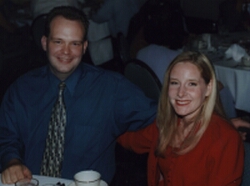Have You Found Financial Peace?
Can the words “finances” and “peace” really coexist? If you have ever heard Dave Ramsey's nationally-syndicated talk show on the radio, you would know that not only can the two concepts coexist, it can be a fun and exciting thing to bring peace into an area of life that often leaves us confused and worried. Ramsey combines an energetic mix of humor, common sense, and biblical values into a program packed with information about budgeting, investing, saving, and a whole host of financial questions.
St. Joan of Arc parishioners Phil and Wende Westhoff first heard Ramsey on the radio several years ago. Soon, Phil bought a copy of one of Ramsey's books as a Christmas gift for Wende, and the couple made a New Year's resolution to begin applying the information they were learning to their financial lives.
“We felt pretty good about our finances, in general,” the Westhoffs explain. “We were always a little ahead - on one hand - but at the end of the year we were looking at our bottom line asking, 'Where did it all go?' We didn't feel we were doing poorly, just not as well as we could.”
Then a statistic jumped out at them. “Dave Ramsey points out that 70% of all Americans are living paycheck-to-paycheck: they are one paycheck away from financial disaster. Seventy percent! We realized we weren't quite at that point, but we weren't doing a whole lot better. We started to think about college for our kids, and retirement, and it really began to hit home.”
The Westhoffs enrolled in a course called Financial Peace University; a 13-week study designed and led by Dave Ramsey. The course was so dynamic, and the results so impressive, they knew they wanted to bring the program back to St. Joan of Arc so that others in the church could realize the same benefits.
The first offering of Financial Peace University at St. Joan is winding up in December, and the response has been very positive. Graduating members are calling the course a “blessing”and pointing to the positive benefits already manifesting in their lives. Married couples have found it has helped them communicate, and all of the participants have learned to focus their financial activities in a more productive way. Many in the class have found that actually managing their finances has been a way to have more money, without really changing their lifestyle drastically.
One participant recently wrote: “I am amazed at how far my paycheck goes now that I am in charge of it, instead of it being in charge of me.” Another participant found that giving had increased: “Tithing is easy now. It is first on my list, instead of waiting to see what I have left at the end of the month – and all my other bills are being paid too!”
Phil says, FPU isn't just for those down on their luck, financially. “We have bankers, CPAs, teachers, nurses, members of the St. Joan staff, single and married, young and old, and they all have felt the program is beneficial – even those who thought they were already in control of their finances. Dave Ramsey makes it both entertaining and educational, and it is structured so that people from all levels of economic understanding can benefit.”
According to the FPU literature, each of the thirteen sessions is designed to be a $2,000 to $3,000 value in the material it teaches. Ramsey's presentation (he leads each session via a DVD video) is exciting, and discussion by the group afterwards expands and deepens the learning. Wende comments, “The group discussion has really drawn people together. They learn from each other, and help each other clarify concepts. It has been so unifying that the current group is already talking about wanting to have a reunion in a few months to see how everyone is doing.”
One added benefit of FPU is increased awareness of how subtly each of us can be drawn into financially-questionable circumstances. Throughout the course, participants have been tracking the number of unsolicited credit offers they have received – and rejected. The total, over an 11-week period? “Over $3.8 million, and that doesn't even include four participants who do not get any offers for additional credit,” says Phil. “It isn't hard to see how people quickly find themselves in hot water if we aren't equipped to recognize financial dangers.”
FPU covers multiple topics including: budgeting, saving for college, retirement, investing, insurance, dumping debt, buyer strategies, buying a home, and others. The average FPU graduate realizes a reduction in debt of $5,300 and and increase in savings of $2,700 in the first 90 days.
The next 13-week session is being offered at St. Joan of Arc beginning on January 24th. An informational orientation session (including a brief video presentation) for anyone interested in learning more about FPU will be held after every Mass the weekend of January 7th and 8th. Those interested in participating will have an opportunity to sign up for the class.
If you cannot attend one of the orientation meetings but would like to be a member of the second class of FPU, contact Phil or Wende Westhoff.
“The Dave Ramsey Show” can be heard locally on Logansport radio AM 1230, from 9:00 to noon.
(You can have your name removed from unsolicited credit offers and other junk mail by visiting: www.dmaconsumers.org/consumerassistance.html or call 1-888-567-8688.)


